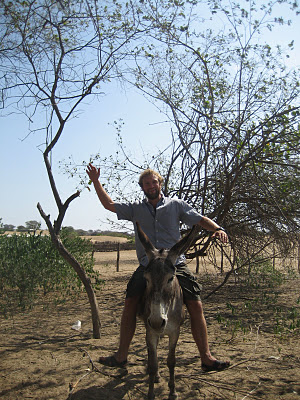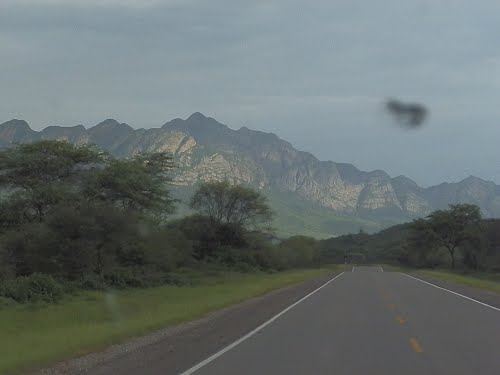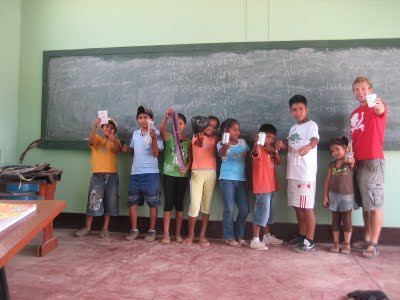
June 1, 2012
When I first arrived in Ñaupe, the town had no electricity. A few months into service, the Peace Corps Renewable Energy Committee sent out an e-mail announcing $1,000 grants available for projects. I applied for and was awarded the full amount to install solar panels to power the school’s aula de inovaciones, which essentially is a computer lab. The panels would power the school’s electronic resources (up until then sitting idly in their boxes) and as an opportunity to teach about global warming and renewable energy. Peace Corps has a policy that requires monetary awards to be met with a community contribution equivalent to 50% of the grant. This practice is something I had seen when reviewing case studies of environmental development in poor communities of the developing world at Bard CEP; an international body provides a portion of the capital necessary to meet the financial demands of the project, but requires participation involvement, and commitment by the beneficiaries to increase local investment, investment, and likelihood for sustainable success. Thus began the great solar panel caper.
A bit of background information on Peruvian political history is important to understand and appreciate this story. The Peruvian government is organized in an extremely top-down, patron-client manner. Political figures are expected to do one thing – create obras (visible, brick and mortar-style projects) in the communities that supported them during the elections. As long as this is happening, everyone ignores the massive amounts of graft and corruption that are going on, and that are almost universally accepted as inevitable, as much a part of Peruvian politics as mandatory voting. As such, at least in the campo, political parties are much more about who you are friends with than what your political beliefs are. If you can get your friend into office, he will get rich and you will get another room built onto the school. This has generated a culture of passivity; Peruvians are content to sit and wait for the projects to come to them, and can be very difficult to inspire to actually pick up the shovel and do the work themselves. In a sense I have found a sort of perverted optimism prevalent in the ñaupeños. They are quite confident that the future is bright because the government will surely soon be putting a chicken in every pot. Interestingly, because there are so many international NGOs working in Peru, investing large sums of money and skipping town, to this feeling is even more intensified.

Ñaupe is a very small, very poor community, and I knew that raising the necessary $500 in cash was never going to happen. So, I decided to test the waters of this political culture and see what I could bring back for Ñaupe. The school director, the science teacher, and I wrote up a project proposal for to the Olmos district mayor, Willy Serrato, asking for municipal funds to purchase another 85-watt solar panel kit, matching funds with the Peace Corps. We had found a company in Piura, GENERA, that specialized in providing solar-powered applainces to rural communities in the Peruvian North Coast that was willing to cut us a deal. When everything was put together, two GENERA representatives, the Ñaupe mayor, the school director, and I went and met with Willy, who assured us that, with pleasure, he would be happy to match Peace Corps funds.
Up until this point, things had gone smoothly. The goal – acquire the community contribution from the Olmos district municipality that would make Ñaupe eligible for the Peace Corps grant – was clear and motivation was high. However, once Willy had given our project the rubber stamp, everyone reverted to the old standby of passive waiting for the mayor to make good on his promise. This was an obstacle that had to be overcome.
Once again, I had learned at Bard CEP by reading environmental development case studies that having an point person who could communicate and work with all involved parties and would be persistent in seeing the project through to the finish was an important key to success. As a Peace Corps Volunteer, rich in time and motivation, this role fell upon my shoulders. I would take the trip to Olmos almost weekly to see how things were progressing and try to hold municipal worker’s feet to the fire. I took advantage of ñaupeño excitement about the project to teach students and community members about global warming and renewable energy.

My frequent visits to the Olmos municipality led to me becoming a familiar face, and to the creation of friendships with some of the workers. In the end, it was probably the familiarity and well-placed friendships that led tot the eventual realization of the project. After seven months of persistence and patience, we finally purchased and installed the solar panel Willy Serrato and the Olmos municipality paid for. Inevitably, as time passed, excitement back home in Ñaupe as to the arrival of a solar panel waned, but though the project was not as splashy as I had hoped, or as it would have been had the panel arrived some months earlier, it was a success. Today, the two solar panels installed on the roof of the aula de inovaciones power the room allowing teachers to use the several laptops the school owns during class time, and facilitating my teaching of after school environmental education classes. Also, most all of Ñaupe has at least a basic understanding of what global warming is, what they can do to combat it, and can differentiate between renewable and non-renewable energy sources.

It was interesting to be a part of an environmental development project similar to some of the ones I had studied at Bard CEP, and having learned from examples prepared me to make a difference in the successful implementation of such a project in my community. But ultimately, working within a patron-client political system as a non-voting, apolitical outsider was exceedingly challenging and frustrating. After completing this project, I resolved to work more at the grassroots level within Ñaupe. My visits to the Olmos municipality have, of late, been primarily to talk with the guard who would let me cut to the front of lines when I had more formal business to attend to.
